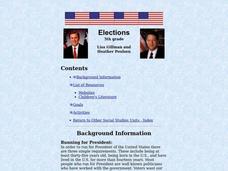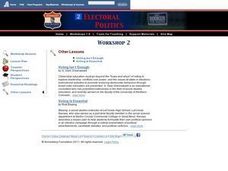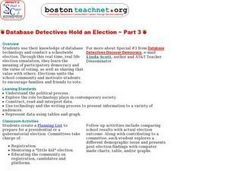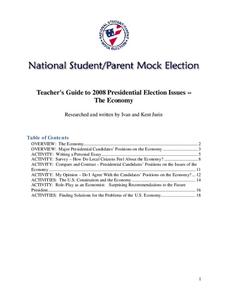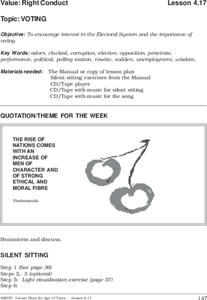Curated OER
Elections
Fifth graders examine the voting process, the electoral college and the voting process. They identify qualities important to a president. They fill out ballot sheets and study the registration forms.
Curated OER
The Election
Students participate in an election. They are asked to vote for one of four candidates without knowing who they are or what they stand for. Students gain an important lesson when voting to make sure that security of freedom and...
Stanford University
The 1898 North Carolina Election
Pupils discuss why the Democrats defeated the Fusion ticket in the 1898 North Carolina election. In this content area reading instructional activity, learners explore three primary documents and answer guiding questions that help them...
Curated OER
Voting Isn't Enough
Pupils compare and contrast their perceptions of politicians and leaders, analyze the consequences of negative public perceptions of politicians, and develop solutions to the problems caused by negative attitudes toward politics.
Curated OER
Growing Voters and Election 2004: Classroom Debate
Students research the issues and platforms of candidates and separate propaganda from process in order to choose a candidate to support. Students examine political parties and their contributions to shaping the foundation of the...
Curated OER
Primary Process in Elections
Students read "How Does the Primary Process Work" and complete the accompanying worksheet. They explore how the primary and caucus process works in small groups or in pairs. They answer questions based on the primary process to...
Curated OER
Why Bother To Vote In Florida?
Fifth graders gain knowledge about the Florida 2000 Presidential Election, proposed changes in the process, and to practice communication skills, including listening and speaking. This lesson really gets at the heart of the changes made...
Curated OER
Database Detectives Hold an Election ~ Part 3
Students use a database to conduct a schoolwide election. They discover the importance of voting and democracy. They incourage one another to vote.
Curated OER
Election Results Map
Students use election night returns to create a map of the results. They can represent popular vote results or electoral votes received. They use the internet to gather information about the electoral college and results.
Curated OER
Proportional Representation: A Fairer Voting System?
Tenth graders work as a grade to conduct a mock election. They tally votes in two different systems and discuss if proportional representation or straight counting of votes leads to a fairer outcome.
Curated OER
The 2004 Presidential Election
Learners examine the 2004 Presidential election between George W. Bush and John Kerry. Using a variety of primary source documents, they discover where the candidates stood on the issues. In groups, they create a tableau in which they...
Curated OER
Teacher's Guide to 2008 Presidential Election Issues: The Economy
Learners discuss the 2008 Presidential election. They examine the significant issues of the election and focus on the economy. Students study the major issues with the economy. Learners decide how they feel about each canidates' views...
Curated OER
Lesson Plan: Bringing Out the Vote
Students explore voter turnout, analyzing why Americans don't vote, and citizen activism through creating community publicity about the 2004 Presidential election.
Curated OER
Voting Adventure
Students discover the requirements they need to be able to vote in a democracy. Using that information, they discuss the importance of voting in an election. They use the Internet to analyze voter participation numbers in their county....
Curated OER
Evaluation of Election Process
Young scholars examine the procedures to elect the President of the United States. In groups, they create their own political cartoon presenting a consensus of their point of views on the process. They identify the strengths and...
Curated OER
Voting and the U.S. Constitution (Past, Present, and Future)
Students discuss the 26th Amendment, then write letters to a future guest speaker. Students listen to the guest speaker and ask them questions about voting and voter turnout. Students then create handbills urging citizens to vote.
Curated OER
Elections for Elementary Students
Students explore various websites that explain how primaries, caucuses, and general elections function. They view sample ballots, and analyze the executive branch, U.S. presidents, and citizenship.
Curated OER
Candidate Debate; Making Informed Voting Decisions
Students study the concept of what it means to be an informed voter who makes conscientious voting decisions based on significant information. In this making informed voting decisions lesson plan, students are introduces...
Curated OER
Voting Time
In this math worksheet, learners solve 4 story problems pertaining to elections in the United States. Students will use all four math operations in these problems.
Curated OER
Why Don't People Vote?
Fourth graders conduct an investigation about the subject of voting. They attempt to answer the essential question of, "Why should someone vote in the first place?" The information is used to help students to develop critical thinking...
Curated OER
VOTING
Students discuss 'The importance of voting'. They elect 5 candidates - each representing one of the five values. Each candidate presents a case why their value is important. The other class members then vote for whichever value/candidate...
ProCon
Electoral College
The Electoral College's role in elections is sometimes confusing and controversial. Pupils use a debate topics website to research the pros and cons of the practice to debate whether the United States should still use the Electoral...
Constitutional Rights Foundation
Purged From the Voter Rolls: Husted v. A. Philip Randolph Institute
Once a registered voter isn't always a registered voter. Academics explore the topic of voter registration and hindrances to remaining registered. The resource focuses on data analysis, federal voter registration law, and Supreme Court...
Center for Civic Education
Becoming an Informed Voter: Creating Initiatives
Continuing from a previous lesson plan on how to read and analyze proposed legislation on election ballots, your class members will now practice writing up their own proposals for a new school rule or local ordinance that will...


